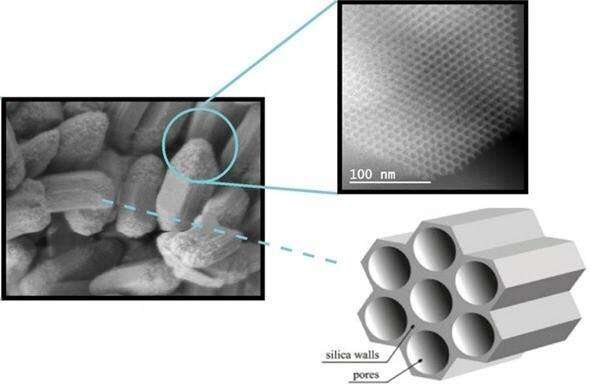Silica particles may lead to new treatments for obesity and diabetes

Engineered ingestible molecular traps created from mesoporous silica particles (MSPs) introduced to the gut can have an effect on food efficiency and metabolic risk factors. The results from studies on mice, published in Nanomedicine, demonstrate the potential to reduce the energy uptake into the body and could lead to new treatments for obesity and diabetes.
So far there are no effective treatments for obesity that hinder weight gain or promote weight loss without problematic side effects. Many of the current medications use small pharmacological agents that can affect the body negatively in multiple ways.
"We chose an innovative alternative approach. Mesoporous silica particles (MSP) are a type of ingestible synthetic silica particles that can be produced with a large surface area and a range of pore sizes," says professor Tore Bengtsson at the Department of Molecular Biosciences, The Wenner-Gren Institute, Stockholm University and the one heading the research team behind the study.
The team hypothesized that the particles could be used as "molecular sieves" in the intestine to trap and block digestive enzymes that break down food and thus reduce the energy uptake into the body (measured as food efficiency).
In the study reported in Nanomedicine, mice were fed high fat, high calorific diets, to induce weight gain, mixed with specially engineered MSPs. The results showed that MSPs reduced food efficiency by 33 percent leading to a lower weight gain, and a positive effect on the metabolic profile, as well as significant lower levels of adipose tissue formation and leptin, together with lower levels of circulating insulin.
"The data presented in this study suggest that tailored MSPs could be used to treat obesity and diabetes in humans, especially when taking into account their excellent safety profiles. Since we completed this work, clinical trials have been devised and are now underway," says professor Tore Bengtsson.
More information: Mia Rinde et al. Mesoporous silica with precisely controlled pores reduces food efficiency and suppresses weight gain in mice, Nanomedicine (2020). DOI: 10.2217/nnm-2019-0262
Journal information: Nanomedicine
Provided by Stockholm University




















